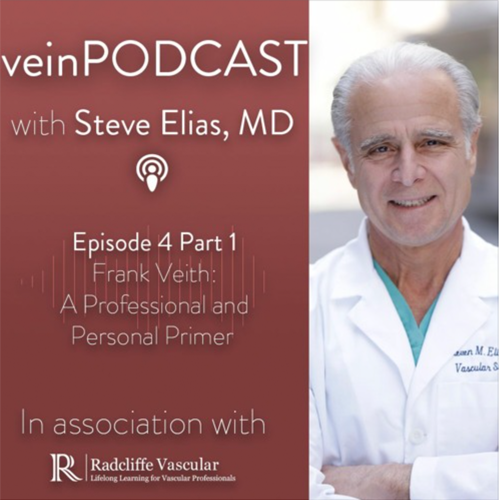
In this two-part series Steve Elias, MD talks to renowned vascular surgeon and organiser of the VEITHsymposium™, Professor Frank Veith.
Part-one sees them discuss a variety of topics in the vascular world including the origins and growth of the VEITHsymposium™ (which is now in its 47th year!), the importance of leadership, working with cardiologists and the controversial issues around procedure abuse in medicine.
Part two no also available.
For more information on VEITHsymposium, program and registration details can be found at https://www.veithsymposium.org.
Hosted by @DrSteveElias.
Produced by @RadcliffeVASCU.
In this episode they discuss:
• [01.00] The history and growth of VEITHsymposium
• [06.25] The endovascular revolution
• [10.00] The importance of leadership
• [11.00] Money talks: the imperfections of medicine and behaviour
• [12.55] The value of education for the treating venous disease
• [16.00] CLI: amputations vs quality of life
• [20.35] New treatment procedures in venous disease
• [25.00] Establishing standards in vein care education: multi-specialties
• [28.40] Learning from cardiologists: radial and peripheral access
• [30.44] The good, the bad and the ugly: procedure abuse, the Vascular Quality Initiative (VQI) and the importance of data.
Transcript Below :
[Dr. Elias] Hi, I'm Dr Steve Elias and welcome to the VEIN Podcast. Respect the elders, embrace the new, and encourage the improbable and impractical without bias. Well, as we said, money talks. And it's a scary thing. I was talking to one of the people who just ... A younger person who went to work for one of the, you know, vein centre kind of ... And they were out for six months, and they were so proud to say, "Oh, I've done about 600 ablations already." Like, 600 ablations, Jesus. In six months? There's something wrong here. It's hard to find that many people to do ablations on. So as you said, this person too, the volume speaks, money speaks. And I don't know how we get to it, but if we can stop paying people to do the wrong thing, people will stop doing the wrong thing. But it's just a huge issue. As you just looked at me in the beginning of this segment, you said you don't have an answer. I don't think anyone has an answer. And I don't know what it's going to take. And the problem is, it may take the payers or government telling us, you know, swinging the opposite direction, what you cannot do and what we will not pay for because we can't control it, so we're just going to stop paying for it.
[Dr. Veith] I do have one possible solution, and that is educating patients in the nature and righteous requirements for treatment in vascular disease. The public and I've written about this recently, talking about promoting the identity of vascular surgeons, how to promote our identity. We're really an unrecognised, unappreciated speciality. Why? Because we're subordinate, for one thing, which is controversial even now. But I think educating the public ... The public, they go online, they read. Educating them that not every varicose vein needs to be treated. Not every pain on walking altercation needs to be treated, that some conditions are benign. Not every asymptomatic carotid needs to be intervened upon. So I think, if you educate the public, maybe they will seek out specialists that are more ethical and aren't of a nature to do a procedure on everybody they see. And the ultimate with these two patients I told you about, one seen by a radiologist, one by a vascular surgeon, and the actual, physical findings were falsified, as well as the duplex findings. And so when I said to the patient, "You don't need any procedure. "You've got nothing. "Your saphenous vein is not enlarged "and does not have reflux," and she said, "Well, what am I going to do?" I said, "I don't know what you're going to do. "Report it to the state." Nothing happened. So the guy continues to practise in this way and obviously has three mansions in Long Island and Florida. And they don't get hurt much by having their normal vein ablated.
[Dr. Elias] Of course they're not going to get hurt much, and that is the problem. If there were dire consequences if you did something wrong, people wouldn't be doing it just to do it. I think the patient education segment is a good thing.
[Dr. Veith] But our societies are, I mean, one of my points in this article which I'm writing with Jim Stanley, may or may not get published in the JVS 'cause it's politically, I think, over the top in some ways, or not ... Its idea is not consensual with every vascular surgeon.
[Dr. Elias] Then again, many of your ideas have not been consensual.
[Dr. Veith] No, of course. But one of the points I make is, the SVS is talking about educating referring doctors. I think that's important 'cause most of them don't know beans about vascular disease. But it's more important to educate the public as to what we do, what we should be doing, what we can do, and what we shouldn't be doing because the public, an educated public, just like an educated public is the answer to corruption in our government, an educated public is perhaps an answer to having all these procedures. You got a blockage in your carotid, it should be fixed. And the patient said, "Oh, god, "I got a blockage in my carotid. "It should be fixed." Well, in many instances, it shouldn't be fixed.
[Dr. Elias] Right, and I think we have an opportunity here. And I think, as the population ages, and those people who are younger become older, it's a greater percentage of people in the population that is very comfortable with information gathering online and stuff. And I think we have an opportunity now to jump into this early, rather than waiting until we miss the boat. You know the data. More than 50% of the people, if they're going to go see Frank Veith or Steve Elias as a doctor, at least half the people have already googled us, see what we're doing, see where our specialities are, reviews, etc., etc. So like you said, we should take that to an advantage, have good places where patients can go to get information.
[Dr. Veith] But my plea in this article, although we cut it down, it was in a chapter that was more ... The details were filled out. My plea in this article is that the SVS and other vascular societies, that are supposed to represent us as vascular surgeons, should make a major PR effort to the public. It's going to cost millions of dollars. We should pay for it. Why? Because vascular surgeons are totally unrecognised as experts, unappreciated, and the public needs to know. How are you going to tell them? You pay millions of dollars, which we should contribute, to have a PR campaign which tells the public what a vascular surgeon is, how they're trained, what they do, how the disease should be treated, how it shouldn't be treated, etc. The vascular societies have a lot of money in their treasury. This should be one of their prime objectives. I don't believe that it is.
[Dr. Elias] No, it probably is not. But it would be a great investment in the future of vascular surgery--
[Dr. Veith] Our speciality.
[Dr. Elias] Right, to educate the public. And we do need to keep that in mind regarding the power of the internet in educating the public because it's relatively easy to do if societies put in the money.
[Dr. Veith] I jokingly said, "Look at the My Pillow guy." Okay, everybody knows who he is. The value of advertising, it works. And we need to make it known to the public what it is that vascular surgeons do. If I go to a cocktail party and people ask me what I do or what I did, I'd say, "I'm a vascular surgeon." They'd say, "Oh, you're a heart doctor," or, "You operate on varicose veins." I said, "Yes, I do operate on varicose veins, "but I do many other things "that are also substantively improving the quality of life." And nobody knows that. And as a result, one of the reasons for now I'm putting on another hat, that we can lose our patients to other specialists because nobody realises what vascular surgeons do, that we're the doctors that take care of all sorts of vascular disease in terms of conservative treatment, indications for operation, interventional treatment, open surgery when needed. And nobody knows that.
[Dr. Elias] Yeah, we need a good PR person. That's who we need.
[Dr. Veith] Well, and we need to spend money as a society. I mean, there are societies raising money for the PAC, the public action committee. And I think we should contribute to that. But far more important that we contribute money, as a speciality, that we are informing the public what we unappreciated guys in caring for vascular disease do. And we haven't done that.
[Dr. Elias] Okay, Frank, I want to push you a little bit on something regarding education and regarding your meeting. First of all, I preface this by saying, I'm glad you asked me to be at the meeting. I enjoyed being at the meeting and interacting and stuff. And we already alluded to that a lot of faculty wanted to come, and so you kind of shortened the talks, and you had gotten your ideas from Henry Kissinger and stuff. Let me run this by you. Have you thought about going, just for one or two little times, in the opposite direction? Meaning not always having a five-minute or seven-minute talk, but instead what, at some other meetings I have run, I call the next big thing, so to speak, and set aside time that, hey, we want everybody to come and hear this next big thing. And you have 15 minutes to it or 20 minutes to it. You don't have to agree with me or not, but would it be, like you say, each day, this is what I want people to hear. Not much is going to be happening for these x number of minutes because I want everybody ... This is a huge topic in vascular and vein procedures and disease. Have you thought about this ever?
[Dr. Veith] Sure, I have. I mean, and so many people advise me, make your talks eight minutes, make your talks 10 minutes. The only talks that I give, a lot of time, are the military talks because I believe that the medical military deserves to be supported. I've been connected with them. I think that you know, supporting our military is vital. So I do give more time to that, to the talks in that session. But the problem is, as soon as you increase the time for one or two talks, you cut down on the number of speakers. And there's tremendous pressure on us, both from industry and from the speakers, to include everybody and everything. And so the idea, I mean, just yesterday, I got 24 talks from Terumo that they want to put on. I mean, come on, are they out of their mind? I can't put 24 ... If I put 24 talks for every major industry supporter, it would be a two-week, three-week meeting. So the reality is, we have just so much time and so much space. And the other thing is, everybody wants to talk from 10 to 12 on a Tuesday or a Wednesday. The reality is, we do the best we can. And it's more important to get it out there. And if something, I think maybe important, like Parodi and his water drinking thing that will cure arterial sclerosis, I think that's important. But I'll just let him have his five minutes or five and a half minutes, whatever, get the message out, and then other vehicles will have to take over and pass the details along. So I'm for it, but I don't see how I can do it. And every year, I say, "We're going to have fewer speakers." Why? Because there's some redundancy, number one. Number two, it costs a lot to pay for the speakers. We pay airfare and hotel.
[Dr. Elias] You're very generous, extremely generous.
[Dr. Veith] Other meetings don't pay anything.
[Dr. Elias] I know.
[Dr. Veith] So if we had fewer speakers, we'd be closer to breaking even or making some money and paying our staff. If we have more speakers, we get closer to break even. And yet, every year at the end, stuff comes in, and I'm struggling to find a spot for stuff. So the making up of the programme is clearly a challenge. And I agree with you, a five-minute talk is nothing. And yet, you go back and watch the television anchors, they have some prestigious guy on, he talks for two minutes, he's done.
[Dr. Elias] No, I understand your concept. And as I'm listening to you now, because it's kind of the opposite of the way ... You know, I run a few meetings, nothing that doesn't equal anything that you do, but my feelings are the opposite of yours. And it's good to have opposite viewpoints. But now, I think I understand a little better. You envision your meeting as a way of letting people get all the information, to see what's out there, and if they want more information about that particular topic they heard, they then go and get it some other way.
[Dr. Veith] Either talk to the guy when he's there or maybe industry, if it's an industry-related talk, we'll have a session where they have 10-minute talks or panels or whatever. But the other thing is, our talks are indexed. So if you want something new, you put it on, and it's a literature citation. It was as-presented at our meeting. And VEITH is not ... Has nothing to do with my name. It's an acronym.
[Dr. Elias] Oh, had nothing to do with your name. Come on, Frank.
[Dr. Veith] You asked about that before. It was not my idea. It was one of my associate's ideas, which I was against because it would illicit hostility, jealousy, whatever. So I vetoed it. But the reason we did it was the get the meeting away from the Institution Montefiore, which had ownership because I was a full-time employee. And that was the reason we changed the name.
[Dr. Elias] No, it's okay, I understand. You seem to be a relatively humble kind of person in general, and I know you don't want a meeting necessarily named after yourself, so to speak. But whether you like it or not, it's associated with you. You know that.
[Dr. Veith] Well, it's not a coincidence.
[Dr. Elias] No, okay. If you had to change anything, because you're always thinking ahead if you had complete control, which you kind of probably do in general, and you could magically make things a little different, what would be one change or two changes you might do to your meeting?
[Dr. Veith] What I'd like to do is have interventional cardiologists and more interventional radiologists come to the meeting as attendees, not as faculty. 'Cause they come when I invite them and we pay for them. But we would like more cardiologists to come. Why? Because we think that ... And as a matter of fact, TCT, when they solicit our relationship, felt that we did as good a job or even a better job than they were able to do in educating about non-cardiac vascular disease. And so I would like more cardiologists to come. They view us as a vascular surgery meeting, and we're really not.
[Dr. Elias] No, I don't think so.
[Dr. Veith] So if we could get 500 interventional cardiologists, that would increase our attendance. It would increase the financial support we had to make our meeting better, taking people to plays and stuff like that for the faculty. And that would be a major change because, so far, it hasn't worked. And we want it to work. Otherwise, I think making our meeting a little smaller in terms of talks would be better. But then the problem comes, you have to dissatisfy industry and faculty because they all want to come to New York and present what they have that's new. So that's a constant source of tension. But the criticism of our meeting is, it's somewhat redundant, and you can't hear everything. The other thing that I would like to see happen is the content of our meeting be made available, I guess for sale at a very nominal price, because there are 30,000 vascular specialists in the world and only four or five thousand come to our meeting. So we would like the content to be made available more widely. And we've tried to do that in a number of ways, and it hasn't worked.
[Dr. Elias] Just as an aside for that, you know, we've thought about this either from a society viewpoint or a meeting viewpoint. In general, people don't want to pay for that for some reason. I don't know why, but they seem not to want to.
[Dr. Veith] The problem is, it costs money to do it. And we pay, I guess, up to $80,000 a year to record the whole meeting, both the audio and the visual. The slides are easy. The slides, they can have 'em, because they're posted on our web page free. But the actual audio and the slides and the panel discussions, brief though they may be, we think has value. And what we're trying to do is package them as what's new with pulmonary embolism, which is a great session put on by Mike Jaffe. I don't organise it. That is the state of the art in pulmonary embolism. Spinal cord ischemia, that session was great. So we could package that. And if we sold it for $25, I mean, that's a cup of coffee at the Hilton. And just so we make a little bit of the money back to defer the cost. And we give it to our attendees for $75. And we get a fair number of those. But as far as selling the whole meeting, nobody ever wants to buy that. It's too cumbersome. I mean, it's 750 talks.
[Dr. Elias] 750 talks, there's hours upon hours. Who has that kind of time?
[Dr. Veith] But if you put it in a concise package, which our sessions do, AV access, then it's manageable, it's bite-size.
[Dr. Elias] Yeah, AV access is manageable. I think there needs to be a way to get the information out because everybody can't make it to the meeting. People want that information. That's one thing for the future. The other thing for the future, you know, where are you going? You're not going anywhere, but sooner or later--
[Dr. Veith] No, no, it's a consideration. It's a real consideration. And to be honest with you, making up the main meeting ... As you know, the venous programme is made up by Lowell Kabnick and Jose Almeida. And I invited you to talk to them if you want to be part of that.
[Dr. Elias] I'd love to be part of it.
[Dr. Veith] Talk to them.
[Dr. Elias] I will talk to them.
[Dr. Veith] Rather than me suggest it, you suggest it. And I'll confirm it.
[Dr. Elias] You'll back me up on it, all right.
[Dr. Veith] Absolutely, 100%.
[Dr. Elias] As long as I've got your backing.
[Dr. Veith] Because I don't know enough about venous disease. I used to. When I see a venous article or something in Medscape, I skip it because I can't master everything. So I think that I want to get more people involved. But as far as making up the components, the arterial and medical components, they're sort of interwoven. And if I can't get a good talk in one session, I can somehow get it in another one. And so I'm trying to get one individual, and this is not yet fully decided, who knows the way I make up the programme 'cause it's a complicated intellectual process. I'm trying to get him involved in seeing how it's done so if something happens to me, he can take over.
[Dr. Elias] But you need somebody, one person, with your vision.
[Dr. Veith] Well, and with time. It's not an intellectually unique process. It's a time-requiring process because the topics are out there. I get access to them in one way or another. Either I hear 'em, see 'em, or read 'em, or somebody sends 'em to me. And then they've got to be refined, re-refined, and ultimately put into session packages which are attractive to audiences that want to come and listen to it. So that process, which I'm currently involved in, is very labour intensive, unpleasant in some ways, 'cause it means sitting down and doing it. And I want somebody who at least has that knowledge, who can then modify it and make it better, maybe more computer-involved.
[Dr. Elias] Right, we always all need to identify who's going to be the next Frank Veith.
[Dr. Veith] Well, right now, Enrico Ascher is the next chairman of the meeting. That's been out there for a long time, and Ken Ouriel, the secondary one. And the issue is that both Ken, who runs syntactics, and Enrico have major, full-time jobs.
[Dr. Elias] Right, they're busy.
[Dr. Veith] And this making up of our meeting, which I used to do in a couple of weekends originally, back in the '80s, is now a full-time job. It's two full-time jobs. As a matter of fact, we were going to go for three days to Florida to get some sunshine and stuff, and we decided I don't have the time to do that. So I think that I definitely want somebody who can take my place doing it, and then maybe do it better. I mean, it's not magic. It's just a process.
[Dr. Elias] Okay, so now let's go another way, semi-wrap up here. The feeling that you get at the end, and you can be a little not self-promoting, but talk a little bit about yourself. The meeting that you get when it's, you know, Saturday morning, Saturday afternoon, your meeting is winding down or whatever, people are beginning to leave and stuff, do you step back and say to yourself, "This was a good one. "This wasn't a good one," or are you just saying, "Well, "I'm just thinking about next year"?
[Dr. Veith] First of all, we definitely evaluate whether the meeting was good in terms of--
[Dr. Elias] No, I'm not talking about we, Frank. I'm talking about you. In your gut--
[Dr. Veith] No, no, we do it as a group.
[Dr. Elias] I understand, but at some point, you're sitting by yourself. Do you ever say to yourself, "That was a really good one this year"?
[Dr. Veith] What I start saying as the meeting is ending, I say, "God, this was pretty good. "I'm still very worried about next year." And I might go home and ... 'Cause we get very little sleep during the meeting.
[Dr. Elias] Yeah, you're up too early.
[Dr. Veith] Up early and so forth. But I start working about the next year, and my mantra is that you win the Super Bowl one year, you got to win it the next year. Every year is a new venture. And there's no guarantee that just because it was pretty good in 2019, that it'll be good in 2020. So I get one good night sleep, and then I start thinking about the following year. So really, there's no great satisfaction from one good year. If we make a little money and can reward the people that are working with us, that's a good thing. So we worry about the money a lot. And we don't know about the financial aspect of it until it's over.
[Dr. Elias] So financially, it's not like you're making enormous amounts of money or losing it. You're looking to hope to relatively break-even, help the people?
[Dr. Veith] I'm looking to do more than break even because, if we don't, if we lose money, we're done. And we have some changes that are coming up in a couple of years, where we're going to take more risk. And so it is a concern because, like any small business, you don't know if it's going to be successful until the end of the year. And you can have catastrophes. One year, I, we had a member, American Airlines, they thought it was a terrorist. The plane was downed in Brooklyn or someplace, Queens, and no Europeans came. And at that point, Montefiore owned the meeting, and they were taking a lot of the financial responsibility. We still did better than break even, but it was a big worry. And the Europeans didn't come.
[Dr. Elias] All right, lastly, I'll ask you from both the arterial and vein side of things. What is the biggest issue involving patient care from the artery side? What is it that we have not solved yet? What disease or type of problem have we not solved yet that we just got to do this?
[Dr. Veith] I honestly believe that the next big advances will come in non-interventional treatment, medical treatment, which I think is the right way to go. I mean, what's happened with the statins, with the PCSK9 inhibitors, awesome. And I think that basically threatens the vascular surgeons and proceduralists because their procedures won't be necessary. If Parodi's right, all you got to do is drink a lot of water, and you don't need any interventions.
[Dr. Elias] I hope he's not right because that's too easy.
[Dr. Veith] It's not easy. I tried it, and you end up going to the bathroom continuously. So I think that and aneurysms, I think, we'll ultimately be able to slow the development of aneurysms and so forth. So I think medical treatment is a huge area for--
[Dr. Elias] Arterial and on the vein side as well?
[Dr. Veith] No, veins are different. I think veins, probably better and simpler interventions. And I think, you know, I've always been wrong about varicose veins. I used to say nobody ever dies from varicose veins. When you got all these big veins, who cares? Wear long pants. But I think, in our modern world, where beauty, cosmetic stuff is important, I think those ladies deserve to be treated. And there'll be less invasive, safer, simpler ways to do it, and I'm all for it. I mean, my wife is constantly saying, "Look at my veins." She doesn't have any veins.
[Dr. Elias] But in her mind, she has some veins she doesn't like, right?
[Dr. Veith] In her mind, she might have some veins. And I think better treatment for oedema and venous ulcers. I mean, there's a company that I worked a little bit with, does air, inflatable--
[Dr. Elias] Right, to help pressure.
[Dr. Veith] And I think, rather than putting on a Gelocast boot and taking it off, cutting it off and all, I think there'll be better, simpler ways of managing venous disease with these new, better systems.
[Dr. Elias] Yeah, that's exactly. Kind of what I think in the vein world, it is both extremes that we need to get better at. One extreme, the end-stage disease, like you said. Ulcers, things like that. We got to get better with that because it's a huge burden on the patient and society. And we haven't done that good of a job in decreasing the recurrence of ulcers or healing ulcers that well. And then, on the opposite direction, when you think about what you were doing and what I was doing to treat cosmetic spider veins, we're doing the same thing we've been doing forever. There is nothing--
[Dr. Veith] There's got to be a better way.
[Dr. Elias] One time, I gave a talk to somebody, Peter Lin, at one of the Fellows courses that I was running, Sclerotherapy: Is It Harder Than EVAR? And in a way, it kind of is because the expectations of patients are huge. You're trying to get a needle into a tiny vein. You're trying to treat something the patient's staring at. With an EVAR, an aneurysm, they may be asymptomatic, not know what's going on, and they have no expectations afterwards. They just want to wake up. So on both extremes, in my mind, this is where the vein world needs to go. We need to do much better on the tiny, tiny veins and much better on the..
[Dr. Veith] You also need better treatment for oedema. I don't have it. I mean, it's a benign condition. My treatment for oedema was to reassure the patient. Wear trousers, if it's a woman.
[Dr. Elias] Nothing bad's going to happen.
[Dr. Veith] Nothing bad's going to happen. You don't have DVT. So I think that better treatment for oedema. And again, these air compressive things, I don't know if they work or not. I don't know if that's an answer.
[Dr. Elias] But technology, as we all know, just keeps getting better and better for everything. And what may be a cumbersome air thing, pressure thing, couple years down the line may be relatively small, easy to use, and really work. So it kind of brings us full circle. No matter what age you are, no matter where you are in your training, you need to look to new things, and you need to also encourage things that don't make sense because they may wind up making sense.
[Dr. Veith] Or didn't work. In other words, you know, the first aeroplanes all crashed. But now, look. So when I have a young fellow or trainee, they ask what to go into. I say, "Go into something that nobody else wants "or doesn't seem attractive "or hasn't worked." Everybody wants to do fenestrated and branched endographs. That's for a select few. And the leaders are already out there, defined. There are 20 guys in the world that are really experts on fenestrated and branched grafts. You're not going to replace them. So go into something that hasn't worked and, you know, try and make it work. Critical limb ischemia, to me, is a huge area of opportunity. And I tell the surgeons, go somewhere and learn all the endo techniques from the cardiologists or angiologists, like Fararici or Schmidt or somebody, and learn the vascular surgery part from somebody who's still doing them because, today, nobody can do these distal bypasses that we did because they don't do enough of them. You have to do 100, 200 to get good at it. And my current trainees are still very good at it because they did 100 during their fellowship. But I see, I go places, and critical limb ischemia is not well-handled by vascular surgeons because they're all interested in doing 100 other things. So super specialisation in vascular surgery, I think. And again, our article talks about having independent board recognition, which has been one of my themes forever, and a failed theme. I think, if we had a speciality board, we could have sub-specialization in venous disease. We could have sub-specialization in critical limb ischemia. We could have sub-specialization in open aneurysm repair, which nobody's any good at anymore 'cause they don't do enough. So those are areas that I think our society needs to address. But whether they will or not, I don't know.
[Dr. Elias] All right, lastly, I give you the final word. Anything we did not discuss that you want to make sure everybody knows about that's going to listen or read this?
[Dr. Veith] No, I just think that vascular surgery is a great area of opportunity, that we're unrecognised as a speciality. We're unappreciated. And somebody else mentioned this, I think Belkin, about our being the firemen in our institution. When somebody else gets in trouble in the operating room, we're the people that are called to put out the fire and stop the bleeding. And as such, we have great value in promoting care in serious vascular disease and in making patients better. But as a speciality in the hierarchy of medicine, we're totally unrecognised. And that is disappointing. It's sad. But that's the way it is. And again, I think having an extensive public education programme that touts vascular surgery is something that is worth doing because so many people have vascular disease. And the lesions are fair game for anybody who wants to address them. And if they're good at it, they should be addressing them. But if they're not good at it, they shouldn't be doing it as an adjunct to another speciality.
[Dr. Elias] ENT.
[Dr. Veith] That's, you know, crazy.
[Dr. Elias] That's good. So you just set up a whole new session for your meeting, speaking about how we educate the public.
[Dr. Veith] It's unpopular. It's unpopular because it's going to be expensive. I mean, you may want to exclude this, but I was very persuaded by an ad on television in addition to the My Pillow guy where the University of Pittsburgh advertised, repeatedly and over and over again, they showed this line of people waiting for a liver transplant. And they said, "You're waiting for" ... I'm paraphrasing it now. "You're waiting for a liver transplant, "and you're going to end up dying. "Don't do that. "Come to the University of Pittsburgh "and get a living donor." And this was an ad repetitively on public television, on one of the channels, or many channels. And if the University of Pittsburgh can afford to do that, and obviously promote their programme, vascular surgery should be able to do that to promote their speciality, which is, you know, country-wide. And yet we haven't done that. And I've talked to some of the SVS leaders. And they basically have said, "No, what's more important "is we educate referring physicians." I think, today, everybody ... I have a neighbour. When the neighbour wanted my advice, they were having some cardiac symptoms. And I said, you know, "You should go and see a cardiologist." I gave them a name of one of my cardiology friends. They went on the internet. They read about it. They asked somebody else. They didn't do what I advised. And we're good friends. So patients, largely, they need to be educated because they're going to do it anyhow. Why not get it right?
[Dr. Elias] Make sure the education is right. So I think that's a good thing to end on, the correct education, not just of doctors, but of patients. I want to thank you, Frank. It was a nice talk. Thanks a lot.
[Dr. Veith] Thank you.
[Dr. Elias] We hope you enjoyed today's VEIN podcast in association with Radcliffe Vascular. We aim to bring you important topics from the vein world, either topics that we ourselves feel are important or you, our listeners, feel are important. So review us on your favourite podcast app. Send your thoughts, comments, and questions to podcast at Radcliffe, with an E, dash group dot com. That's podcast@radcliffe-group.com. You could also register to access newsletters, videos, and peer-reviewed journal articles. Thank you, glad you listened. This is Dr Steve Elias. And we'll see you on the next veinPODCAST.
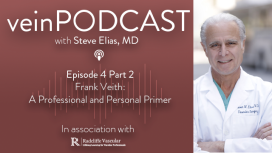
They discuss a variety of issues including the ethics of money and malpractice and the importance of educating patients on vascular surgery and vascular disease. Listen to Frank’s take on the VEITH Symposium’s success, how he’d like to see it develop in the future and why he feels interventional cardiologists and radiologists are essential for VEITH’s long-term growth.
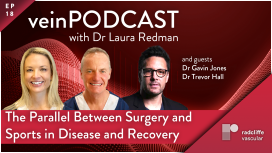
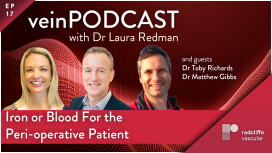
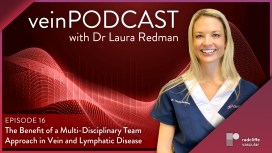
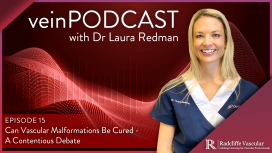
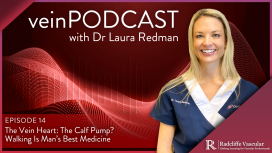
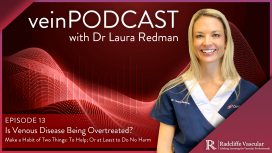
In this week's episode, host Dr Laura Redman considers the darker side of medicine to discuss whether venous disease is being treated for the right reasons and is joined by panellists, Prof Lowell Kabnick (Vascular Surgeon, US) and Dr Muhammed Zaki Shaik (Life Mount Edgemont Hospital, SA) who together discuss this topical issue with consideration for treating C2 varicose veins, venous ulcers and venous insufficiency.
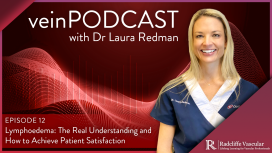
This month's episode hosted by veinPODCAST's new anchor, Dr Laura Redman (Vascular Surgeon, Cape Town, SA) features guests Prof Håkan Brorson (Plastic Surgeon, Malmö, Sweden) and Suzie Davey (Occupational/Lymphoedema Therapist, SA) to discuss issues surrounding primary and secondary lymphoedema in patients.
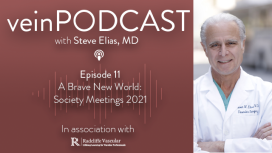
In this month’s podcast episode, Steve Elias, MD is joined by executive directors from The American Venous Forum, The American Vein and Lymphatic Society, The Society of Vascular Surgery and The Society of Interventional Radiology, who together look at the current challenges for the future of society meetings and consider the steps they are taking to work towards a ‘new normal’.
In this session, they debate and discuss suggestions for innovation, as well as new engagement strategies, as they hope to embark on society meetings in a ‘Brave New World’.
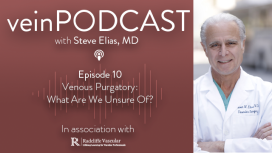
This month’s episode is ‘the podcast with all the questions but not all of the answers’ as Steve Elias, MD, and his expert guest panel including Mark Meissner, Raghu Kolluri, Manu Aggarwal and Tom O’Donnell consider the interesting questions in the grey zones of venous disease. Hear them discuss the unknowns around techniques, technology, diagnostics, therapeutics and education in venous disease and how there is so much more to understand in this exciting field of medicine.
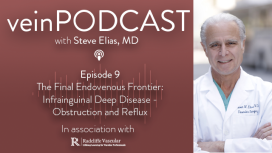
In this latest veinPODCAST episode, Steve Elias, MD, meets with an expert panel to discuss Infrainguinal Deep Venous Disease from many aspects including reflux, post-thrombotic and obstructive disease. They consider what can be done now to help patients with current knowledge and available technology and what is needed to further support treatment of this condition in the future?










